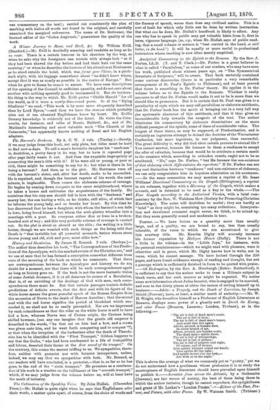History and Revelation. By James H. Braund. 2 vols. (Seeleys.)—
The author thus describes his book, "The Correspondence of the Predic- tions of the Apocalypse, with the marked events of the Christian era," and we see at once that he has formed a conception somewhat different from ours of the meaning of the book on which he comments. That there are correspondences between the Apocalypse and history we do not doubt for a moment, nor that there will be such correspondences again as long as history goes on. If the book is not the mere fantastic vision of some Jewish dreamer, if it at all deserves its names of a Revelation, that is, of an unveiling of the dealings of God with men, such corre- spondences there must be. But that certain passages contain definite predictions of definite events, that the first seal with its figure of the white horse means the great peaceful epoch of the Roman Empire from the accession of Nerva to the death of Marcus Aurelius ; that the second seal with the red horse signifies the period of bloodshed which suc- ceeded it, we shall not be so easily persuaded. Nor are we impressed by such coincidences as that the rider on the white horse is said to have had a bow, whereas Nerva was of Cretan origin, the Cretans being skilled bowmen, (can any one imagine that the gentle old emperor is described in the words, "he that sat on him had a bow, and a crown was given unto him, and he went forth conquering and to conquer "?), or that when the irruption of the barbarians after the death of Theodo- sius has to be identified with the "First Trumpet," Gibbon happens to say that the Goths, "who had been condemned to a life of tranquillity and labour, deserted their farms at the first sound of the trumpet." On the contrary, this seems the merest trifling to us. We sympathize, there- fore, neither with preterist nor with futurist interpreters, unless, indeed, we may say that we sympathize with both. Mr. Braund, as our readers will have concluded, is a preterist,—that is, so far as he has gone, to the end of the "sixth trumpet." He promises as a continua- tion of his work in a treatise on the fulfilment of the "seventh trumpet," which, if we may judge from the volume before us, will at least have the merit of industry.






























 Previous page
Previous page